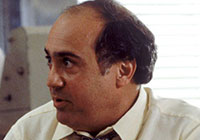|
|
|
|
Tin Men
|
 |
|
Hollow Men
For
its first fifteen minutes, Barry Levinson’s Tin Men promises to be a rousing
second-take on Robert Zemeckis’ cult item Used Cars (1980). It’s the
same champs vs. chumps formula, as two rival “tin men” (aluminium siding
salesmen), Bill and Ernest, played superlatively by (respectively) Richard
Dreyfuss and Danny DeVito, reveal to us every trick in their dirty book (like accidentally
dropping money on the floor, and then offering it to their clients to prove
they’re honest).
This
is the sort of comedy that depends on making the audience identify with the
central city-slick fast-talking tricksters – and definitely not with the
workaday suckers who provide the butt of the laughs. Compassion is low and life
is cheap – the old W.C. Fields ethos of “never give a sucker an even break”.
While
it rockets along on such cruel fuel (the same fuel that ran masterpieces like
Hawks’ His Girl Friday [1940]), Tin
Men has a fine way with detailed visual inventiveness. Normally redundant
elements like street scene establishing shots or pans within the characters’
work spaces are transformed into great Tati-esque frescoes – and what wonderful
body-talk from Dreyfuss and DeVito: crook necks, stiff shirts, slow burns,
hysterical outbursts.
But Tin Men proves not brave enough to keep up the show. It drops cruelty
and tries instead for some very badly judged pathos. This is more than a simple
problem of poor dramatic gear-change; it is a question of Levinson’s ideology,
his world-view. There was something brewing in his Diner (1982) – something we were all willing to overlook, since
that was such an impressive debut film – which bubbles right over the top in Tin
Men.
Levinson
knows only one kind of pathos – masculine pathos, of a particularly indulgent
sort. He is drawn to archetypal, crazy guys (tricksters, rebels, outsiders) who
are also glory boys – victims of a world, or a history, that changes abruptly
and leaves them behind. Tin Men asks
us to feel sorry for men who are, in the first place, crooks (fair enough, if
their pranks affirmed some life-force) and, more damagingly to the film’s case,
absolute misogynists.
Ernest’s
wife, Nora (Barbara Hershey), gets passed back and forth as an exchange taken
between the twin heroes, and the film makes her ultimately accept the outcome
of these dealings – Levinson is not terribly good at creating believable female
characters!
Indeed,
Nora’s passing liberal intolerance (the film is careful to cover its
ideological tracks) at the antics of her wild-and-crazy guys is echoed, on a
larger scale, by the McCarthy-like Commission hearings that outlaw the tin men
from their vocation – the difference being that she gives in to their rough
charm, while the Commission doesn’t (so she’s OK, dig?).
Levinson
endeavours to further shield his heroes from internal criticism by covering
them in a thick goo of early 1960s nostalgia – ah, those glory days! But, by
the end, I was definitely on the Commission’s side: ban the bastards! For a
film that starts out so funny, it’s sad (but indicative) that Tin Men should end up becoming this
offensive.
MORE Levinson: Good Morning, Vietnam, Rain Man, Sleepers, Wag the Dog, Disclosure © Adrian Martin April 1987 |
![]()